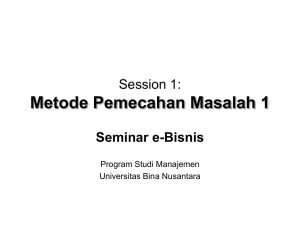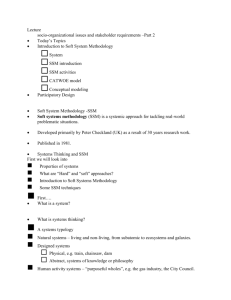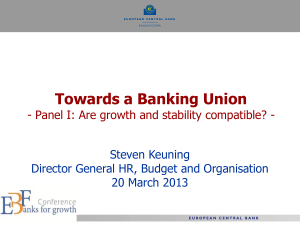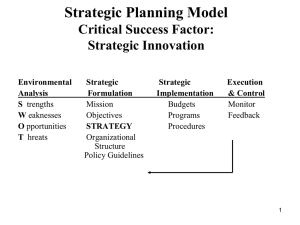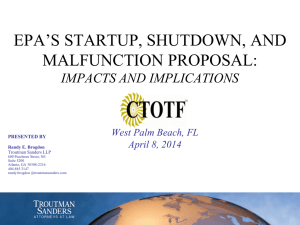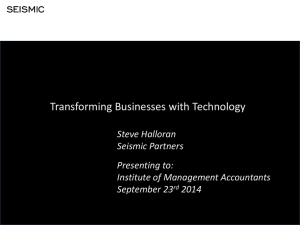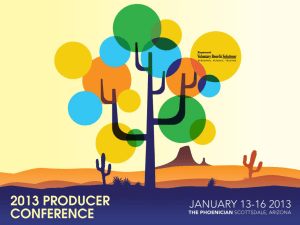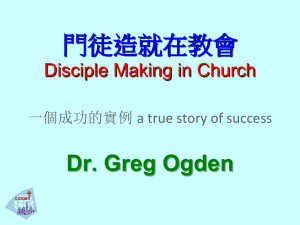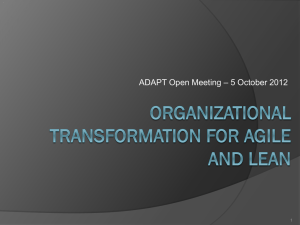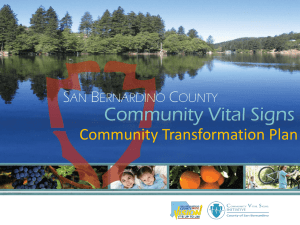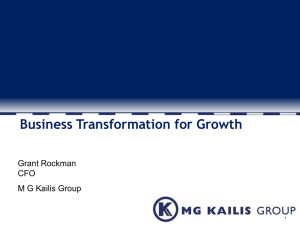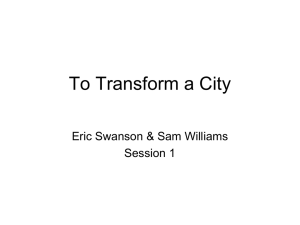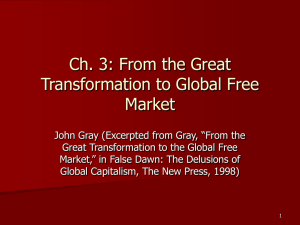Lecture 10
advertisement
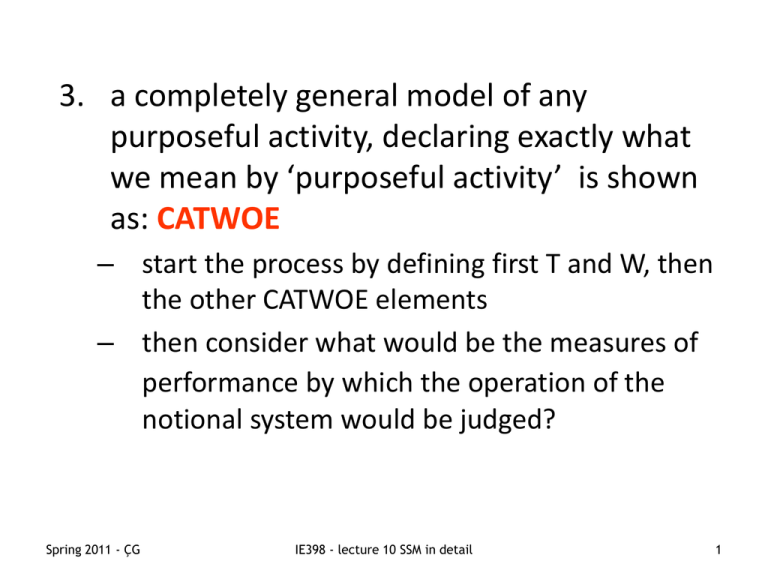
3. a completely general model of any purposeful activity, declaring exactly what we mean by ‘purposeful activity’ is shown as: CATWOE – start the process by defining first T and W, then the other CATWOE elements – then consider what would be the measures of performance by which the operation of the notional system would be judged? Spring 2011 - ÇG IE398 - lecture 10 SSM in detail 1 Spring 2011 - ÇG IE398 - lecture 10 SSM in detail 2 Spring 2011 - ÇG IE398 - lecture 10 SSM in detail 3 – criteria to tell whether the transformation T is working, in the sense of producing its intended outcome, i.e. criteria for efficacy; – criteria to tell whether the transformation is being achieved with a minimum use of resources, i.e. criteria for efficiency; and – criteria to tell whether this transformation is helping achieve some higher-level or longer-term aim, i.e. criteria for effectiveness – 'three Es' will always be relevant in building any model, but in particular circumstances other criteria might also apply, such as elegance (Is this a beautiful transformation?) or ethicality (Is this a morally correct transformation?) The judgement is yours as to what criteria are needed Spring 2011 - ÇG IE398 - lecture 10 SSM in detail 4 4. are RDs 'Primary Task' or 'Issue-based' definitions? – never work exclusively with either Primary Task (PT) or Issue-based (IB) RDs, most investigations will best feature a mixture of both types 5. given PQR, an RD, CATWOE, the 3Es and PTIB, all you need is logical thinking; • the most common error is to take your eye off the root definition and start modelling some real-world version of the purposeful activity being modelled Spring 2011 - ÇG IE398 - lecture 10 SSM in detail 5 Spring 2011 - ÇG IE398 - lecture 10 SSM in detail 6 • for an example consider the BAKÜ-CEYHAN case • assume for simplicity that each person's viewpoint can be expressed in its own single root definition, even though there will be cases where one person may construct several root definitions • the following root definitions can be inferred from the dialogue (although you may read things somewhat differently) – The PM is responsible for the entire operation of BOTAŞ; he wishes to keep down his overall costs – a CATWOE for him can be developed taking the hose system as the relevant one; the transformation is probably that the hose takes crude oil from storage tanks to tankers at minimum overall cost Spring 2011 - ÇG IE398 - lecture 10 SSM in detail 7 • • • • Customers: BOTAŞ Actors: BOTAŞ workers and tanker operatives Transformation: transfer oil from tanks into bulk carriers Weltanschauung: need to supply markets with oil at minimum cost • Owners: the government. • Environmental constraints: pumping rates, sea conditions and environmental concerns – A system owned by the government and operated by BOTAŞ staff, with the cooperation of tanker operators, to transfer oil from the Ceyhan tanks to waiting bulk carriers at minimum cost. It must operate within physical constraints such as pumping rates and sea conditions, plus environmental constraints. The system is needed so that oil can be supplied to world markets at minimum cost. Spring 2011 - ÇG IE398 - lecture 10 SSM in detail 8 • a CATWOE and a root definition for PO on the other hand might be: – – – – Customers: tanker operators Actors: BOTAŞ workers and tanker operatives Transformation: hose takes crude oil from storage tanks to tankers Weltanschauung: my job is to provide a reliable service to tanker operators – Owners: BOTAŞ – Environmental constraints: pumping rates, sea conditions and environmental concerns, need to keep costs down • A BOTAŞ-owned system to transfer oil from Ceyhan tanks to waiting bulk carriers as reliably as possible, operating within physical constraints such as pumping rates and sea conditions, plus environmental constraints and within cost limits. The system is operated by BOTAŞ workers and tanker operators, and is needed because my job is to provide a service to tanker operators. Spring 2011 - ÇG IE398 - lecture 10 SSM in detail 9 • finally for the MM: – – – – Customers: BOTAŞ Actors: BOTAŞ workers and tanker operatives Transformation: hoses that would have failed early now last longer Weltanschauung: better maintenance helps provide a better service and saves money. – Owners: BOTAŞ – Environmental constraints: pumping rates, sea conditions and environmental concerns, need to keep costs down • A BOTAŞ-owned system of maintenance to improve the service life of hoses used to transfer oil from the Ceyhan tanks to waiting bulk carriers at low cost. It must operate within physical constraints such as pumping rates and sea conditions, plus environmental comtraints and within cost limits. The system is operated by BOTAŞ workers and tanker operators for the benefit of BOTAŞ. Spring 2011 - ÇG IE398 - lecture 10 SSM in detail 10 Spring 2011 - ÇG IE398 - lecture 10 SSM in detail 11 1. assemble the guidelines: PQR, CATWOE, the RD, etc. 2. write down three groups of activities - those which concern the thing which gets transformed (the unpainted fence); those activities which do the transforming (painting); and any activities concerned with dealing with the transformed entity (e.g. judging if it improves the appearance of the property); this will give you a cluster of activities. 3. connect the activities by arrows which indicate the dependency of one activity upon another; for example, in Figure 1.3 activity 7 (paint the fence) depends upon both activities 4, 5 and 6, since you can't paint the fence until you've obtained both brush and paint and prepared the fence Spring 2011 - ÇG IE398 - lecture 10 SSM in detail 12 4. add the three monitoring and control activities, which always have the structure shown in Figures 1.2 and 1.3. 5. check the model against the guidelines; ask yourself: does every phrase in the RD lead to something in the model? and: can every activity in the model be linked back to something in the RD or CATWOE, etc.? if the answer to both questions is ‘yes', then you have a defensible model • Spring 2011 - ÇG experienced SSM practitioners working from the same RD might well produce somewhat different models; this is because they are interpreting the words in the RD, PQR, CATWOE etc somewhat differently; the important thing is that you can defend your model as representing what is in your RD, PQR, CATWOE, etc IE398 - lecture 10 SSM in detail 13 Spring 2011 - ÇG IE398 - lecture 10 SSM in detail 14
